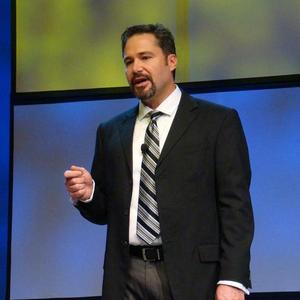Joe Jobe: 'The truth matters' in getting RFS back on track

Photo: Ron Kotrba, Biodiesel Magazine
January 20, 2015
BY The National Biodiesel Board
Arguing that federal policy makers must see through the false attacks by renewable fuels opponents and provide certainty for their advanced biofuel industry, biodiesel advocates opened the doors to the public Jan. 20 at the National Biodiesel Conference & Expo in Fort Worth, Texas.
Last year, the Obama administration failed to finalize biodiesel volumes required under the renewable fuel standard (RFS). As a result, indecision surrounding the policy led numerous biodiesel plants to shutter operations, decrease production and lay off workers.
“President Obama has declared an all-of-the-above energy policy and made addressing climate change a priority,” said Joe Jobe, CEO of the National Biodiesel Board. “The RFS has demonstrated success in contributing to both those top priority goals.
“It is our goal for 2015 to get the RFS back on track.”
After the record year of nearly 1.8 billion gallons in 2013, the EPA initially proposed in November 2013 to hold the 2014 RFS biodiesel volume at 1.28 billion gallons. The agency subsequently withheld a final rule and has still not established 2014 volumes, even as it has signaled that it will improve the original proposal. The continued uncertainty throughout the year has left the industry in a state of limbo, although many biodiesel companies continued producing based on assurances from the administration that RFS volumes would increase.
Advertisement
Advertisement
Delivering his remarks at the Fort Worth Convention Center, Jobe began his presentation by invoking the tenants of Joseph Pullitzer and the first rule of journalism: “the truth matters.”
While acknowledging the biodiesel industry has many friends and good working relationships among oil producers, RFS opponents have distorted the record of renewable fuels, as well as made alarming predictions for the program—predictions that have proven wildly inaccurate, Jobe said. As a result, he said, the implementation of effective policy has been consistently damaged by their misleading rhetoric.
In one example, Jobe pointed to a 2012 study by the American Petroleum Institute that predicted that biodiesel requirements under the RFS would result in a “Diesel Death Spiral” that would increase diesel fuel costs to about $15 per gallon in 2014 and $70 in 2015. Their predictions proved to be wildly incorrect, yet they continue to site the flawed study.
Obviously, Jobe said, it’s an understatement to say those predictions were vastly off the mark.
“Sensationalist tabloid headlines have no place in serious public policy debate—it makes for bad public policy,” Jobe said.
Now, Jobe said, some in the petroleum industry claim that America has achieved energy independence thanks to fracking of shale oil in Texas and North Dakota and from strip mining of Canadian Tar Sands. However, the fallout from the decision not to decrease production by the Organization of Petroleum Exporting Countries (OPEC) has demonstrated once again the fallacy of that argument.
Advertisement
Advertisement
Since OPEC’s Thanksgiving decision, an already glutted fuel market became flooded in oil from Saudi Arabia and other members of their international cartel, driving prices so low they threaten to bankrupt the domestic fracking industry.
With a trillion dollars in reserves and production costs less than $6 per barrel, “The Saudis can outlast all their competitors,” Jobe said. “This is what monopolies and cartels do. They use anticompetitive tactics to raise, or in this case lower prices to squeeze competitors and alternatives out of the market. Then they increase prices to maximize their profits.”
That’s why the RFS is such a critical policy, Jobe said. Only by diversifying the transportation fuels market and providing competition to crude oil can the U.S. truly achieve energy security, he explained.
“The RFS is a good policy—it is pro-competitive, pro-consumer, free-market capitalist policy,” Jobe said.
And, “2015 was intended to be a turning point for the RFS,” he said. “For the first seven years, conventional biofuel was designed to lead the growth in volumes until 2015 where conventional biofuel is statutorily capped at 15 billion gallons. From 2015 on, advanced biofuels are intended to lead the growth of the program. And so far, biomass-based diesel has emerged as the only domestically produced, fully commercialized advanced biofuel.
“2015 has to be the year we get back to the future of this program and out of the uncertainty the past.”
Related Stories
President Trump on July 4 signed the “One Big Beautiful Bill Act.” The legislation extends and updates the 45Z credit and revives a tax credit benefiting small biodiesel producers but repeals several other bioenergy-related tax incentives.
CARB on June 27 announced amendments to the state’s LCFS regulations will take effect beginning on July 1. The amended regulations were approved by the agency in November 2024, but implementation was delayed due to regulatory clarity issues.
SAF Magazine and the Commercial Aviation Alternative Fuels Initiative announced the preliminary agenda for the North American SAF Conference and Expo, being held Sept. 22-24 at the Minneapolis Convention Center in Minneapolis, Minnesota.
International Sustainability & Carbon Certification has announced that Environment and Climate Change Canada has approved ISCC as a certification scheme in line with its sustainability criteria under its Clean Fuel Regulations.
Legislation introduced in the California Senate on June 23 aims to cap the price of Low Carbon Fuel Standard credits as part of a larger effort to overhaul the state’s fuel regulations and mitigate rising gas prices.
Upcoming Events









